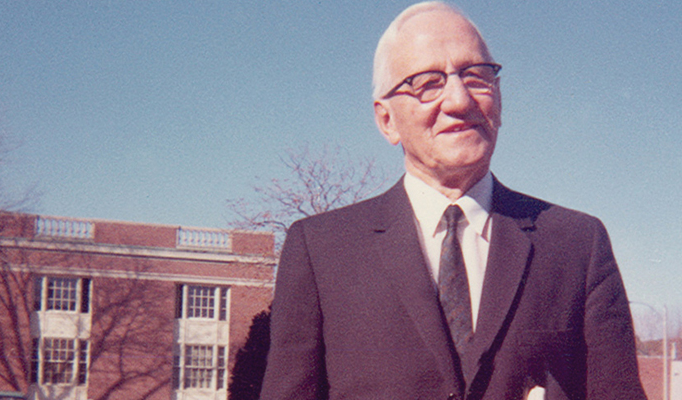
Would you like Jesus to one day say to you “Well done, good and faithful steward”? Many Christians think the Gospel only relates to our inner spiritual life and has nothing to do with our practical daily experiences in business and economics. Some think the Kingdom of God is unrelated to our present real life, but only refers to the afterlife or the second coming. Without realizing it, we often shrink the Kingdom of God to a private, subjective religious experience. What if God’s unshakable Kingdom is meant to come daily in every area of our lives, not just in the future? (Hebrews 12:28)
Dr. E. Stanley Jones, the ‘Billy Graham’ of India, held that the Kingdom of God is the master key in which everything in our lives finds purpose, meaning, integration, and goal. God’s Kingdom is wholistic, embracing every area of our lives, including material possessions, social relationships, and economics. The Kingdom of God is rooted in the sacrificial love of neighbour as family and in the Golden Rule: “To love your neighbor turns out to be the soundest economic realism.”
Our neighbour, said Jesus, is the one who is in need. The Kingdom law of love of neighbour shifts our economics from self-centered competition to Christ-centered co-operation: “industry is a dog-eat-dog affair – selfishness ruling both capital and labour.” Jones saw the Church as a potential Kingdom friend to both employees and employers, bringing about a co-operative one new man out of two conflicted parties. Kingdom economics functions best as people become brothers and sisters helping brothers and sisters, rather than as master and servant, or boss and employee.
Christianity is the most materialist religion on earth. Jones taught we need to accept the material as God-made and God-given, and to use as much of it as will make us more physically, mentally, and spiritually fit for the purposes of the Kingdom of God. Matter is not the enemy. Christians are not gnostic spiritualists who avoid the material world and hide out in the spiritual world. Matter is God’s creation that we need to steward for the benefit of all.
Jesus, in 16 out of the 38 recorded parables, spoke about stewardship. Stewardship and economics are the same Greek word oikonomos. Kingdom economics is about stewarding God’s material world. We become in the spiritual what we do in the material. Stuff matters, but it all needs to be put on the altar – that is, offered to God – or it becomes idolatrous. The Kingdom of money, of ‘mammon’, must bend its knee to the Kingdom of God. Victory and economic breakthrough comes through surrender. You cannot serve two masters. You will hate one and love the other (Matthew 6:24). Have you noticed that money is a terrible master and false god, crippling our very personalities?
Money, said Jones, is as sacred as the soul, when dedicated to the Lord. Undedicated money enslaves us. We serve either the Kingdom of God with our dedicated money or the Kingdom of darkness with our undedicated money. Dedication determines our economic destiny. Kingdom economics come down to where our heart is: “where your treasure is, there your heart will be also.” (Matt. 6:21). Love for God and love for neighbour are the guide for our use of dedicated money, power, and influence. Treasures on earth for Jones were made to be stored up for others.
Biblical economics calls us to receive and give according to need. Jones grounded the Christian Ashram retreat around the two pillars of the Open Heart and the Overflowing Heart where people were invited to share not just what they want, but what they need. God is committed to meeting our needs, physically, mentally, socially, and economically (Acts 4:35). As we seek first God’s Kingdom, our needs will be met (Matthew 6:33).
Kingdom economics includes radical generosity to others according to our ability (Acts 11:29). Christians are the most generous people on earth. Only generosity brings about economic stability and financial security. Jones compares money and possessions to manure that stinks greatly if hoarded in one place, but able to produce a great harvest when spread around by Kingdom principles.
Equality of opportunity, said Jones, with liberty and justice for all is our God-given birthright. Jones described the word ‘all’ as foundational to true democracy: “the most explosive and revolutionary word in our national history.” ‘All’ applies regardless of race, colour, gender, education or class. Democracy, said Jones, needs to be applied to economics as well as politics.
Where there is no equality of opportunity, it is easy for those with great wealth to assume that they are better and more deserving than others. In an acquisitive society, worth becomes determined by wealth. With those born wealthy, this sets the stage, said Jones, for lack of ambition, parasitism, selfish hedonism, and wasted time. Giving our children too much money can easily bring about a flabby, irresponsible character. The dead hand of riches slowly strangles their life forces. Perhaps this is why Jesus said how hard it was, even humanly impossible, for the rich to enter the Kingdom. But with God, all things are possible (Matthew 19:23-26).
The Golden rule (Matthew 7:12) illustrates how meeting the needs of others is key to our needs being met. Need trumps greed. Kingdom people are the first to see and meet other people’s needs. To whom much is given, much will be required (Luke 12:48). To ignore the needs of others is to end up consumed with our own endless wants and problems. Balancing the giving and receiving of need helps us live longer and with greater health. Too little and too much result in a diseased society and diseased individuals. Needs contribute; luxuries choke. Jones said: “Need is written across our bodies. If we eat less than we need, we are unhealthy. But if we eat more than we need, again we are unhealthy.” Part of the health crisis in the Western world is our poor stewarding of the food that God has given us. While competition increases production, only the love of neighbour will rebalance the distribution of food so that none would suffer from undereating or overeating. Jones observes that: “too little produces problem children, and too much also produces problem children. . . If I have tears – bitter tears – for the underprivileged, I have just as bitter tears for the overprivileged… Is God speaking to us here at the place of the economic?”
When Jones visited Russia in 1934, he was shaken by the apparent economic successes. They never let him visit the starving millions in the Ukraine. When socialism tries to imitate the example of the Book of Acts generosity, it inevitably uses compulsion and threat, resulting in a lose-lose situation where food production and access is reduced. The Holodomor genocide of four million Ukrainians in the early 1930s was a direct result of socialist bureaucracy stealing food from the common person in the name of forced utopian solutions. The Russian bureaucrats were paying for massive purchases of western industrial equipment by pillaging and selling off the Ukrainian grain. Because of a culture of lies and denial, they had convinced themselves that there was still plenty of food for the Ukrainians to eat. Solzhenitsyn said that socialism cannot survive without relying on violence and lies. Our main defense against socialism, said Jones, was an economy so sound that communism becomes irrelevant.
One of the worst things about Marxist ideology was that it robs people of the incentive to work hard, and rewards pretending. The term incentive comes from the Latin Incentivum ‘something that sets the musical tune’. Socialism incentivizes people to work the system instead of doing work. What actually motivates you to sing your life’s song, serving with a Kingdom smile? Money alone is an insufficient incentive for a Kingdom person who serves unto the Lord with all his heart (Colossians 3:23). The greatest is the servant of all (Mark 10:42-45). The only healthy competition is to out-serve one another. Jones incisively said: “An economy of a personal attitude that doesn’t give a man an incentive to work hard to supply his needs produces a mentality which ultimately burdens society. Anything that takes away personal initiative hurts personality and, thereby, weakens society.”
Unlike socialism, Jones did not reject private property: “I am not against property and privilege. I want more of both – for everybody.” Jones wanted everyone to succeed in life.
Kingdom economics balances self-love and other-love, what Jones calls the self-instinct and the herd-instinct. We don’t have to choose between caring for ourselves and others. Jones commented: “The Christian faith says: ‘Thou shalt love thy neighbour’ (the other-regarding urge) ‘as thyself’ (the self-regarding urge). It exactly balances the caring; you are to care for others as you care for yourself.”
Many nowadays see economics as amoral, merely mathematical or abstractly scientific. Jones closely connected ethical economics to a healthy lifestyle: “The wrong thing morally is the unhealthy thing economically.” Our economic sins are often the most damaging, being hidden under respectability.
Poverty and unemployment grind down the soul, leading to unhealthy choices. Jones saw his own unemployed father turn to alcohol, deteriorating day after day. His father sold much of the household furniture to feed his addiction. Jones dared to believe with Kingdom eyes that poverty could be eliminated if we had the collective will to do so. We can transform economic injustice into Kingdom justice through the way of the cross. Charity, said Jones, is easy; justice is difficult. You cannot right the other relationships, said Jones, unless you right the economic.
Abundant living depends on abundant giving. Jesus taught that it is better to give than receive (Acts 20:35). Tithing our first 10 percent to God and then giving sacrificially, said Jones, expresses the truth that God the King owns it all, and we are his Kingdom caretakers. Jones told the story of a poverty-stricken boy named Colgate who met a steamboat captain who encouraged him to give his heart to Jesus and give one tenth of all he made to Him. The boy promised both, and through his Colgate Toothpaste Company, ended up giving millions to serving others.
E. Stanley Jones believed that Kingdom co-operation through profit-sharing would bring greater wealth, more equitably distributed to those in need. We are blessed to be a blessing to others. Jones persuaded many Christian business people to do profit-sharing with their employees, bringing about harder work and productivity.
What might happen to Canada in 2024 if we chose to lay our economic future at the feet of Jesus’ unshakable Kingdom?






I wish to receive your magazines
We have added your email address to our regular mailings of new articles
Thanks very much for your messages am so blessed, this time we such kind of teachings . Am a Pastor and founder of the The Great Zion Ministries International Church, can I use this material to teach in our Churches ? .
Hallelujah!
Well done
Great news
Good message may God bless you . I would like to receive the magazine
Great work Pastor!
praise God that’s what we’re working for one day when Jesus says to me well done good savants you have been faithful in rittle so come and inheriting what was prepared for you before the creation of Earth apostle James Buyinza
wonderful Light magazine I read and watching videos so happy and praying for your children ministry and other activities.
we love to work with you in India. welcome to India share the Gospel.
warm welcome to India visit our spiritual and social activities.
we are busy with our Lord’s works. pray for our ministry in his kingdom of God.
please send your books and booklets and tracts for free distribution and my studies.
I am awaiting for your reply soon
yours in his service
Rev.yesuratnam Taneti
Gospel Church
Sivrao peta D.No 3-96
Maruteru 534 122
Andhra pradesh, India
How much i like this passage. With the status of our African state, though and the world over all.
Thank you Rev Dr.. I really enjoyed the article but the problem is that the Church lack the knowledge and wisdom of the Kingdom of God here on earth.
this DR james buyinza i,m having a bible training class in in uganda i teach pastors and leaders i need training matrials so far i have grauduated 85 pastors who are now in the filed of our lord jesus christ saving the lord in difirent dinominations
your,s DR james